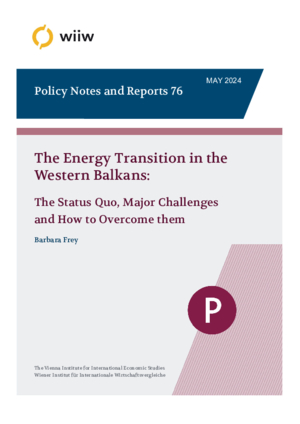The Energy Transition in the Western Balkans: The Status Quo, Major Challenges and How to Overcome them
Barbara Frey
wiiw Policy Note/Policy Report No. 76, May 2024
28 pages including 4 Tables and 5 Figures
The Western Balkan (WB) countries, with the exception of Albania, generate most of their energy from lignite, which contributes to the highest levels of air pollution in Europe. Energy shortages and high electricity costs are major issues in the WB region, with significant political implications. The region’s reliance on coal does not comply with the EU acquis or the Paris Agreement, leading to potential delays in EU accession negotiations. The transition to renewable energy sources also faces many legislative and political obstacles. It is consequently imperative that the current energy systems be transformed. In order to facilitate private-sector investment and an efficient, cost-effective energy supply, this shift will require regional collaboration in the production, transfer and supply of energy as well as the quick and resolute adoption of renewable energy sources. To increase renewable energy use, WB governments need to increase related public spending, ensure that a reliable regulatory framework is in place, modernise energy infrastructure and pursue energy-efficiency measures. International partners should adjust their approach to the region, providing much more financial support and helping to streamline energy policies based on local needs. By sharing its experience with all these issues, Austria could become a key partner of the Western Balkan countries on their path towards achieving an environmentally sustainable energy future.
Keywords: Western Balkans, Energy Transition, Renewable Energy Sources, Energy Infrastructure Modernisation, Energy Efficiency
JEL classification: Q41, Q48, Q58
Countries covered: Albania, Bosnia and Herzegovina, Kosovo, Montenegro, North Macedonia, Serbia, Western Balkans
Research Areas: Macroeconomic Analysis and Policy, Sectoral studies
